- Home
- Nick Carter
The Berlin Target Page 5
The Berlin Target Read online
Page 5
With ease he vaulted the stone wall and moved like a specter through the tombstones. It was difficult reading the names and the dates on the markers through the dark visor before his face, but he dared not raise it. The last thing he wanted was for the Turk to see his face.
"He always delivers," Hessling had said. "He doesn't know me; he mustn't know you. He will hand over the goods; you will hand over the envelope. You will never see each other again."
Klauswitz had to hand it to Oskar Hessling. He was a planner. He planned everything down to the last detail. Nothing was left to go astray.
That was why Klauswitz had agreed to perform this service for the man. That and, of course, the fringe benefits.
When, deep in the cemetery, it became just too dark to make his way, he used a small penlight.
At last he found it: KRONER LANE, PLOTS 16–34.
He had barely snapped off the light when a short, dark figure in jeans and a dark jacket materialized from nowhere.
"Good evening, effendi."
"You are the Turk?"
"I am."
"Frau Horning is buried near here."
"I believe she is in Number Eighteen."
"You have the merchandise?"
"You have an envelope for me?"
Klauswitz used two fingers to withdraw a plain white envelope from beneath his jacket.
"One second."
The Turk faded into the darkness and returned in seconds. He crouched by the mound of a grave and set a leather case between them.
"Hold the light," Klauswitz said, passing it to the other man.
The case was about two feet by one foot and approximately five inches deep. He popped the two clasps and opened the lid, turning the case at the same time so that the light would reveal its contents.
"It is a French F1, Tireur d'EIite, 7.62mm. They say it will consistently group ten rounds into a circle smaller than inches at better than two hundred meters."
The black helmet nodded, and beneath the dark visor Klauswitz's thick lips curled in a smile. "It will."
Dieter Klauswitz had used the French sniper rifle before, but never with a silencer. This one was a beauty, broken down into five parts. The bipod was attached, and the barrel was equipped with a flash hider.
The man behind the visor loved guns. He deeply regretted that he would have to abandon this one after it had done its work.
"How clean is it?"
"Stolen in Marseilles two weeks ago," the Turk replied. "Absolutely untraceable. Do you need ammo?"
"No. That's been taken care of." Klauswitz passed the envelope over and closed the lid of the case.
"Good hunting," the Turk chuckled, and the two men faded into the darkness in different directions.
Seconds later the steady bass throb of the BMW's engine filled the park, and the rider headed north toward Wedding and Wiebe Strasse.
* * *
Gertrude Klammer backed the Mercedes into the dirt-floored garage. She killed the lights and the engine, and left all the keys on the front seat.
The envelope was beneath the bricks just as the message said. Gertrude didn't bother to check the contents. She knew the thousand marks would be there.
Stuffing it into her purse, she stepped out onto the walk of Wiebe Strasse and carefully closed the door. When the padlock was snapped, she hurried toward the lights of the larger Moabit Allee.
The Wedding section frightened her. It was full of empty houses too run-down for the landlords to repair. Young, hippie-type squatters and single foreign workers occupied them because they could do so for nothing.
But there were also criminals of all kinds in the area. She was elated to find a cruising cab within two blocks.
* * *
Unknown to Fräulein Gertrude Klammer, she had a protector. He sat on the BMW at the other end of Wiebe Strasse in the darkness between two houses. He didn't move until the woman was safely in the cab and it was speeding away.
The last thing Klauswitz wanted was for this woman to be molested in any way. It would be a disaster for the police to question her reasons for being in the Wedding section alone at this hour.
He didn't start the bike. He pushed it to Number 9 and unlocked the door with the second key Hessling had provided.
Inside, he was the epitome of efficiency. He closed the door tightly and snapped the BMW's light on, aiming it so the beam illuminated the rear of the garage and the Mercedes. Then, from the rafters of the garage, he took down a wicker picnic basket and a suitcase.
The wicker basket contained sandwiches, fruit, and a thermos of juice. He lifted everything out and put the gun case in the bottom of the basket. When the thermos and food were replaced, the basket was filled perfectly to the lid.
The suitcase went into the trunk of the car. Inside it was a briefcase and the complete wardrobe of a traveling businessman.
Quickly, Klauswitz stripped out of the leather and boots. Beneath them he was completely naked. From the suitcase he donned socks, shorts, dark blue pinstripe trousers, and a white-on-white shirt. He carefully knotted a light blue tie and slipped into the suit jacket.
Everything fit, including a pair of black Gucci loafers, imprinted on the inside heel with the mark of the Italian shoemaker's Fifth Avenue store in New York City.
In fact, all the clothes bore American labels.
He removed the jacket and shoes, and placed them on the Mercedes's rear seat. Carefully, retaining the knot in the tie, he removed it and placed it on the jacket.
It was a bit of a struggle to get the leathers on over the clothing, but he managed.
Next he checked the briefcase.
The papers were all in order and scrupulously accurate. They detailed recent business transactions between Mockdendorf Limited of West Berlin, a toy manufacturer, and Klein Enterprises of Albany, New York.
Mockdendorf was a very real company, with offices in West Berlin, Hamburg, and Frankfurt.
Klein Enterprises was a fiction, but the Vopo guards at Checkpoint Charlie would never know that.
He replaced the papers and picked up a passport packet. Inside, he found a U.S. passport issued in the name of David Klein. Address: 414-C Shamrock Towers, Albany, New York. Occupation: President, Klein Enterprises.
He flipped to the back pages of the passport where frontier stamps were placed. David Klein had entered the West German Republic two days before, via Frankfurt.
The passport photograph was of a blond-haired, smiling Dieter Klauswitz.
Also in the packet was a payment voucher for the Metropol Hotel. This he would need in order to stay overnight in the German Democratic Republic. And he had to stay overnight, because the remaining item in the packet was a first-class ticket on Tuesday morning's Aeroflot flight from East Berlin to London's Heathrow Airport.
Well done, Dieter thought, very well done. I commend you, Herr Oskar Hessling.
The last item in the briefcase was a small, square box. Inside it were ten 7.62mm steel-cased shells. Each one of them had been doctored, a minuscule amount of potassium cyanide inserted in their tips.
Klauswitz was sure he would need only one, two at the most, but he emptied all ten of the shells into the zippered pocket of his black leather jacket.
He closed and locked the doors and the trunk lid of the sedan, and then surveyed the car and the garage.
Everything was in readiness for his return the following day.
After securely attaching the wicker basket to the rear of the bike, he wheeled it from the garage and locked the door. On Moabit Allee he cranked the big machine and roared south toward the brighter lights of downtown Berlin.
As he rode, he retraced the plan and the escape route. He had gone over it three times in minute detail in his mind by the time he parked the machine at the foot of the Insulaner Mountain.
At the end of the war, Berlin was rubble. Before the rebuilding process could start, huge amounts of twisted steel, concrete, bricks, and other debris had to be disposed of or burned.<
br />
The solution that was eventually adopted was to heap the scattered rubble into huge artificial hills, cover them with soil in a tiered effect, and plant the whole with grass, shrubs, and small trees. As a result, these rubble «mountains» now dotted the skyline of Berlin.
The largest of them was the Insulaner, soaring 260 feet into the air. From its peak most of West Berlin could be seen.
But come the next morning, Dieter Klauswitz would be interested in only one piece of West Berlin real estate: the wide, sweeping steps of the American Memorial Library. It was on those steps, in a little more than twelve hours, that several West German dignitaries and the American, Stephan Conway, would speak.
Klauswitz removed the wicker basket from the rear of the BMW and strolled across Mehring Damm to a phone booth.
He deposited the correct coins and dialed. The phone was answered on the first ring. He easily recognized the now-familiar wheeze.
"Herr Hessling, this is Pilgrim."
"Ja, mein Herr. The car?"
"Fine, and the suitcases as well."
"Excellent," came the wheeze. "And the papers?"
"Also fine. Everything is go."
"I have already informed our employer. The money should reach me within the hour. It will be deposited in the Bahamas account ten seconds after the newscast confirming."
"It has been a pleasure doing business with you."
"Danke. Auf Wiedersehen, Herr Pilgrim."
"Auf Wiedersehen, Herr Hessler."
Dieter Klauswitz walked back across the boulevard, around the fence that bordered the swimming pool that had been built on the lower tier of the rubble mountain, and began climbing the Insulaner.
* * *
Oskar Hessling poked the telephone's disconnect button and strained his stubby fingers toward the half-eaten box of chocolates. He popped one into his mouth, chewed, and washed it down with a slurping drink of schnapps.
"Good man," he wheezed, and burped, "damned good man. I knew he would be. And a loner. Perfect."
Oskar Hessling had a habit of talking out loud to himself. Often he would ask himself questions and give himself answers. It had come from years of being alone. It was only one of the myriad oddities about the man. Another was the fact that, in the vast twenty-odd rooms of the mansion where he now sat, there was not a single mirror.
The reason for this was because Oskar Hessling could not stand to look at himself.
He was huge. Not even corpulent, grossly fat, or obese could describe the 450 pounds of flab and blubber that rolled in waves beneath his tentlike clothing.
His jowls hung far below his chin on either side, and his eyes were like tiny dark holes in the sickly white balloon of his face.
But as fat and grossly ugly as Oskar Hessling was, it did not affect the cunning of his razor-sharp mind. Unlike Hans-Otto Voigt — the other master of crime in West Berlin — Hessling needed no army of stooges around him. He did everything necessary to amass his great wealth with just his bank of telephones.
Now he squinted in deep concentration. In two seconds he came up with the number he desired from over five hundred in the memory bank of his phenomenal mind.
"Ja?"
"Guten Morgen, Frulein. The pilgrim has landed."
"I understand."
"I can expect you soon?"
"Mein Herr, I think it would be wiser…"
"My dear lady, I have survived these many years by being extremely careful. I shall expect you in fifteen minutes."
"But…"
The dial tone filled the room from the phone's speaker box. Hessling punched up a new number. He didn't have to think to dial this one. He used it often.
"The Golden Calf."
"Put Antonio on!"
"Certainly, Herr Hessling."
The Golden Calf was just one of the many slightly sleazy nightclubs Hessling owned on or around the Ku'Damm featuring female strippers or male transvestites.
"Ja, mein Herr?"
"Guten Morgan. Are you busy, Tony?"
"Only fair."
"Good, good. I have a tender morsel arriving soon, Tony. Class and looks, a real beauty. You will enjoy her."
"The usual fee, mein Herr?"
"Of course, my boy… and perhaps a little bonus. This is very special. Shall we say an hour?"
"I'll be there."
"Good."
He broke the connection, thought, and dialed yet again. The London number rang several times before the brusque tones of a female voice on an answering machine came through.
"Peter Limpton's office. Mr. Limpton is not in. If you will leave your name, number, and message at the tone, Mr. Limpton will return your call as soon as possible."
Hessling waited until the dull tone sounded, then wheezed out his message. "I believe I will be able to deliver the shipment of radio parts after all, Mr. Limpton. If you will please call me in a day or so at the Berlin number I gave you, we can discuss the financial arrangements."
As the dial tone filled the room, Hessling managed a laugh. It hurt his chest. He washed another chocolate down with schnapps, and dialed the last number he would need that night.
"Stasis, Corporal Kleimann."
"Colonel BaIenkov, bitte."
"Bitte."
Stasis was short for Staatssicherhehsdienst, the East German state security service. Colonel Volatory Balkenkov was Moscow's KGB liaison to Stasis.
Hessling wiped drool from his chin and smiled as he waited. He delighted in his own cleverness. He would soon have it all, and what better way to force the American to sell him the goods than to enlist the aid of the Russians. They needn't know that he was selling the goods right back to them through Peter Limpton.
"Balenkov."
"Guten Morgen, mein Herr," Hessling rasped.
"Ah, Hessling. I was wondering when you were going to call. What do I get for my little favors?"
"As yet, Colonel, I am not sure. But the prospect for reward is great. Sometime in the late afternoon, today, an American, David Klein, will check into the Metropol."
"Yes?"
"His real name is Dieter Klauswitz. He's a West German, currently out on parole and awaiting trial for robbery. That should be enough to hold him for a few days, shouldn't it?"
"More than enough. But why?"
"I must make a contact or two on Tuesday. I'll call you that evening and let you know what to do with him, and how great both our rewards will be. Auf Wiedersehen, Colonel."
"Wiedersehen, Herr Hessling."
Hessling pushed the disconnect button and poured himself another glass of schnapps. He wouldn't be needing the telephone anymore.
He could almost see the Russian's face grow florid and hear the curses being thrown at him over the wall.
Hessling didn't care. He had provided many services for the Russian pig. This, in the end, would be another one. Needless to say, the service would also swell Hessling bank accounts to bursting.
But enough of business, he thought. It was time to contemplate the pleasures that would take place shortly.
Antonio and the woman.
His heart was already palpitating too much. He would have to be careful and not get too excited.
* * *
She parked several blocks away and walked down the winding street lined by tall hedges. Over them she could see the slate roofs and soaring gables of huge, stately houses against the dark sky.
It was easy to spot Herr Oskar Hessling's mansion. It was larger and grander than all the others on the street.
With a slightly shaking hand, she pushed the button on the entry buzzer. She disliked doing business in the wee hours of the morning.
"Ja?" said a voice through the speaker grille.
"I am at the gate."
"Ah, yes, Fräulein, come in. The front door is unlocked."
There was a buzz and the gate popped open. She stepped through and closed it behind her.
The house sat well back from the street at the round of a U-shaped, tree-l
ined drive. It was deathly quiet other than the tapping of her heels on the cobbled walk. The front door opened with a grating sound from the hinges, and she stepped into a long, high-ceilinged hall with huge oak doors leading into well-appointed rooms on either side.
The last door on the right, my dear. It is my study."
The voice came from a small speaker secreted somewhere in the wall above her.
The house was baronial, with dark, wood-paneled walls, rough-hewn ceiling beams, ornately carved balconies, displays of stuffed animals, and brooding tapestries. There were even crossed sabers and a knight's helmet over the fireplace at the end of the hall.
Hessling sat in the special chair that had been designed and reinforced to accommodate his huge bulk. Ranged on the horseshoe desk around him were television screens, computer consoles, and the telephones he used to run his empire.
The room was as gargantuan as its owner, and the walls, floor to ceiling, were lined with leather-bound tomes. She was sure that not a single one of them had ever been opened.
"Guten Morgen, Fräulein."
"Herr Hessling."
"You are even more beautiful than at our last meeting."
Hessling could feel the pressure in his pounding heart as he watched her glide across the room. Her amazing body was draped in an expensive black dress that stylishly revealed richly curved hips, flaring thighs, and jutting breasts.
The woman wasn't a classic beauty, but she was vibrant and eroticism seemed to ooze from her. And even more than her sensuality, Hessling sensed that beneath that calm, cold beauty lay a full-blown predator.
Hessling liked that. It added spice to what he was going to force her to do.
Dismissing the leer in his piglike eyes — and trying not to look at his grossness with her own — the woman set the briefcase on the desk beside him. She flipped the catches and opened the lid. "It's all there… in dollars."
Before she could retreat, he grabbed her arm. Her stomach churned as his thick lips slobbered over the back of her hand.
"You're shaking, my dear."

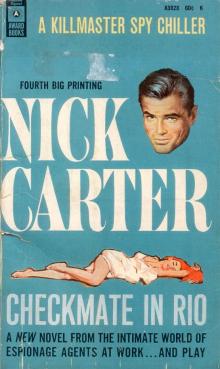 Checkmate in Rio
Checkmate in Rio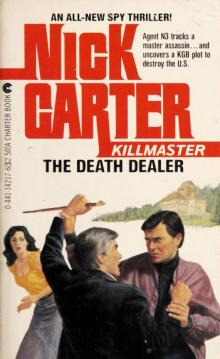 The Death Dealer
The Death Dealer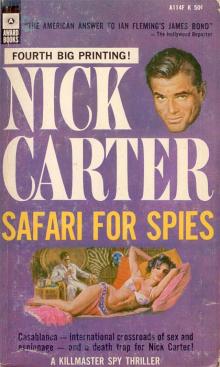 Safari for Spies
Safari for Spies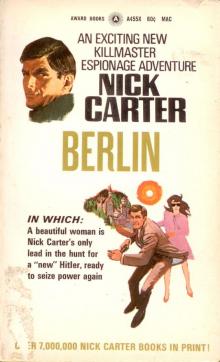 Berlin
Berlin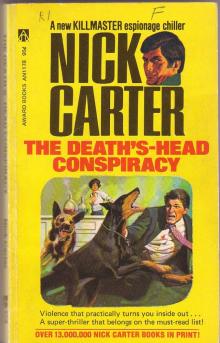 The Death’s Head Conspiracy
The Death’s Head Conspiracy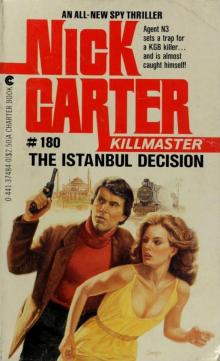 The Istanbul Decision
The Istanbul Decision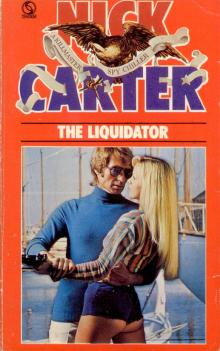 The Liquidator
The Liquidator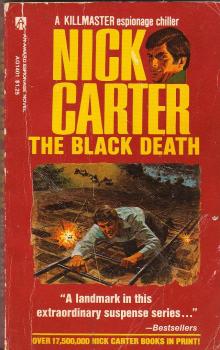 The Black Death
The Black Death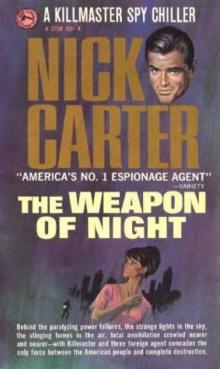 The Weapon of Night
The Weapon of Night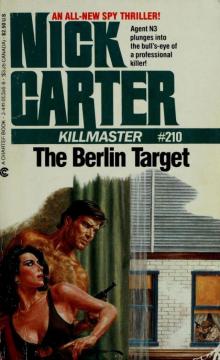 The Berlin Target
The Berlin Target Temple of Fear
Temple of Fear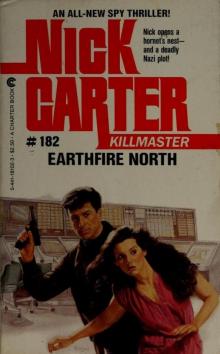 Earthfire North
Earthfire North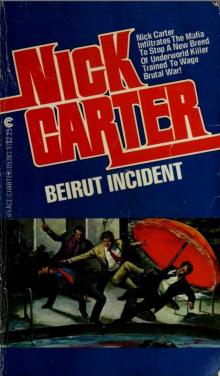 Beirut Incident
Beirut Incident White Death
White Death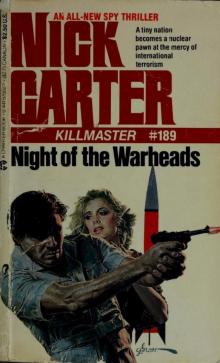 Night of the Warheads
Night of the Warheads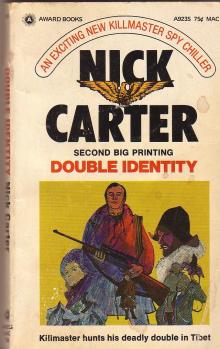 Double Identity
Double Identity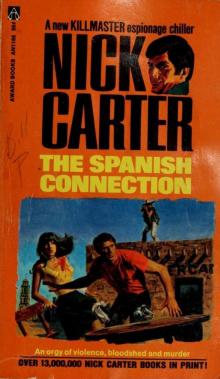 The Spanish Connection
The Spanish Connection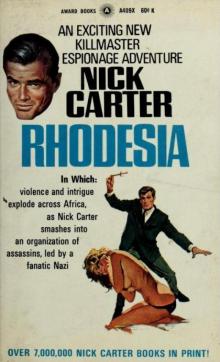 Rhodesia
Rhodesia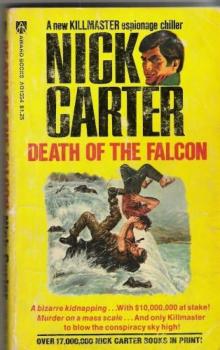 Death of the Falcon
Death of the Falcon The Executioners
The Executioners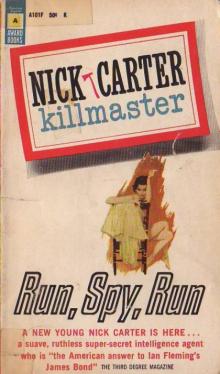 Run, Spy, Run
Run, Spy, Run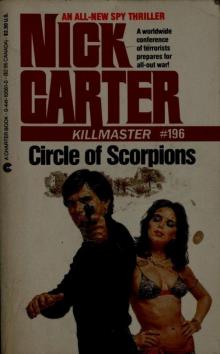 Circle of Scorpions
Circle of Scorpions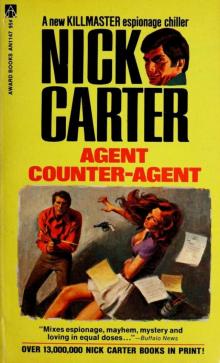 Agent Counter-Agent
Agent Counter-Agent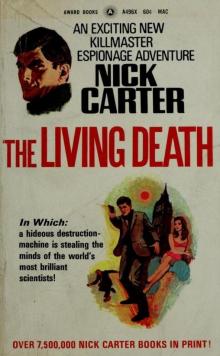 The Living Death
The Living Death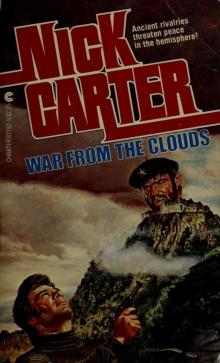 War From The Clouds
War From The Clouds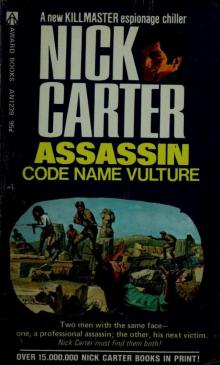 Assassin: Code Name Vulture
Assassin: Code Name Vulture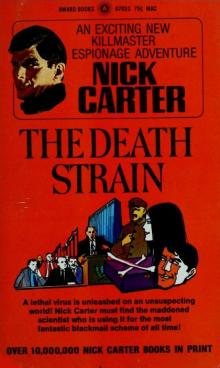 The Death Strain
The Death Strain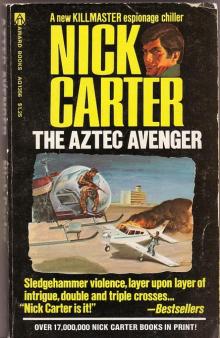 The Aztec Avenger
The Aztec Avenger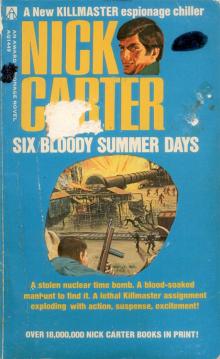 Six Bloody Summer Days
Six Bloody Summer Days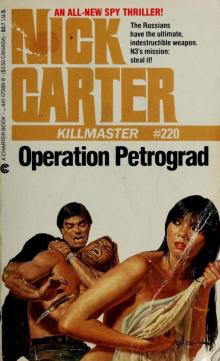 Operation Petrograd
Operation Petrograd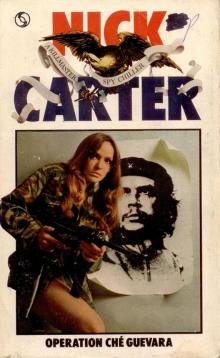 Operation Che Guevara
Operation Che Guevara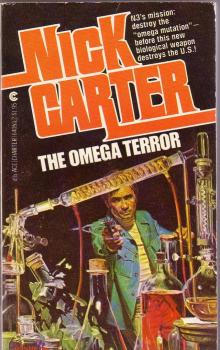 The Omega Terror
The Omega Terror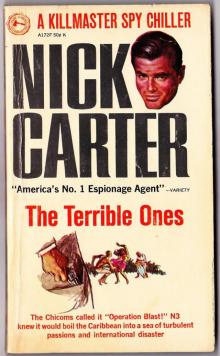 The Terrible Ones
The Terrible Ones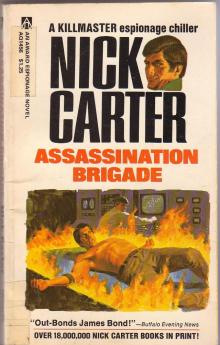 Assassination Brigade
Assassination Brigade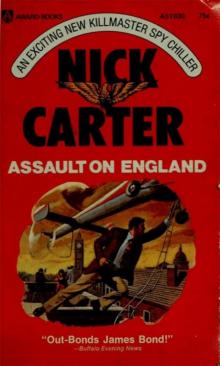 Assault on England
Assault on England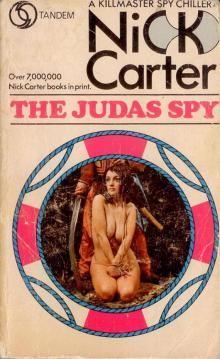 The Judas Spy
The Judas Spy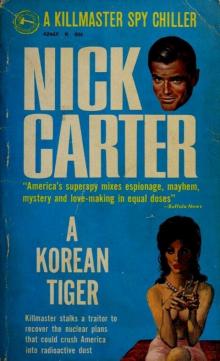 A Korean Tiger
A Korean Tiger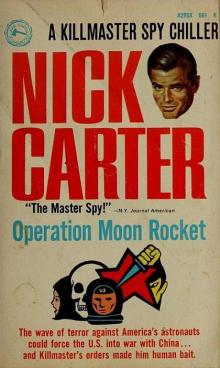 Operation Moon Rocket
Operation Moon Rocket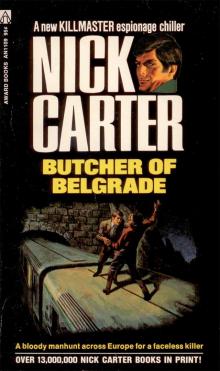 Butcher of Belgrade
Butcher of Belgrade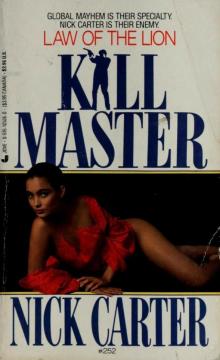 Law of the Lion
Law of the Lion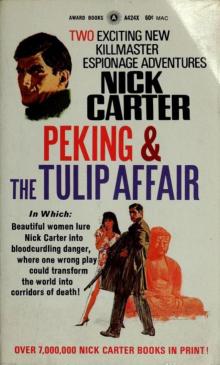 Peking & The Tulip Affair
Peking & The Tulip Affair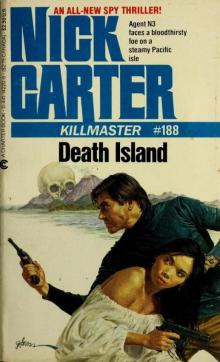 Death Island
Death Island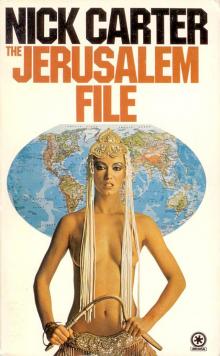 The Jerusalem File
The Jerusalem File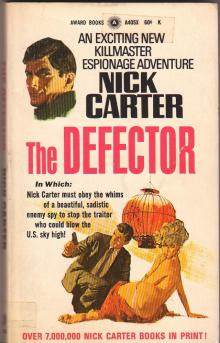 The Defector
The Defector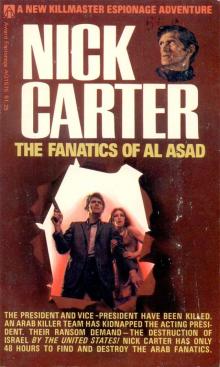 The Fanatics of Al Asad
The Fanatics of Al Asad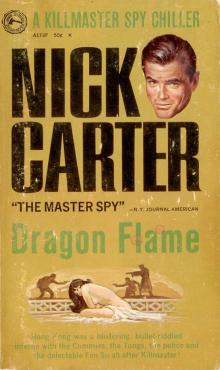 Dragon Flame
Dragon Flame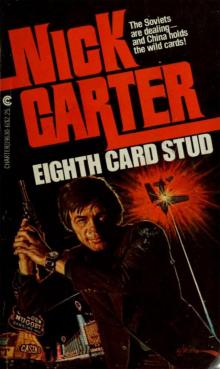 Eighth Card Stud
Eighth Card Stud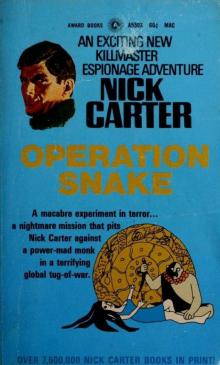 Operation Snake
Operation Snake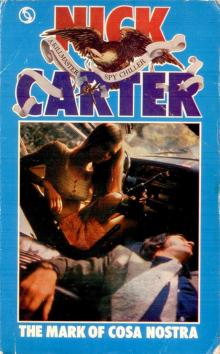 The Mark of Cosa Nostra
The Mark of Cosa Nostra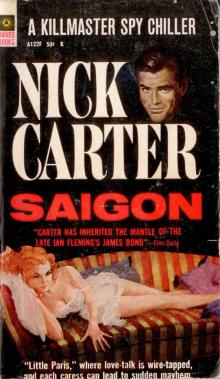 Saigon
Saigon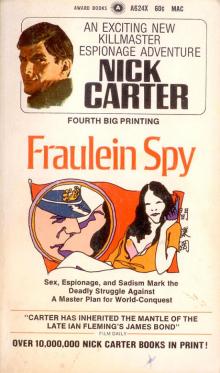 Fraulein Spy
Fraulein Spy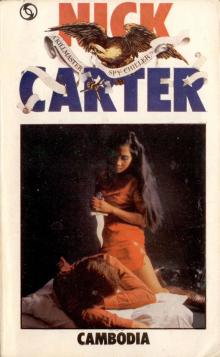 Cambodia
Cambodia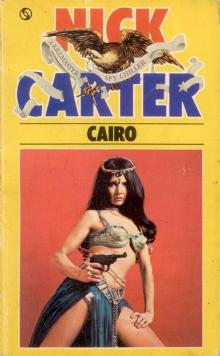 Cairo
Cairo